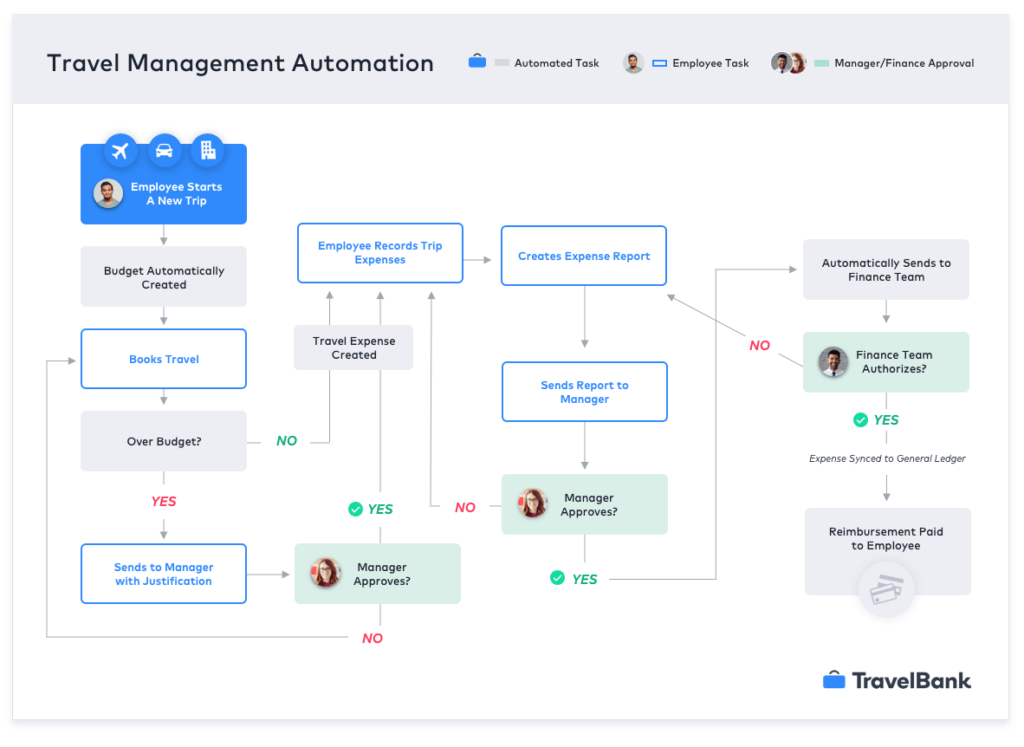The Travel Management Automation Imperative: A Guide for Finance Teams
In the business world, finance managers are focused on budgets, account reconciliation, payment dates, and the bottom line. As business travel continues to skyrocket, the burden placed on accounting teams has multiplied considerably.
Compound that with the fact that managing travel expenses and budgets has been a process deeply rooted in spreadsheets, mountains of receipts, and chasing down managers to approve expense reports, and provide employees with timely reimbursements. It can be an absolute nightmare, to say the least.
>> Related: 2 Barriers Keeping CFOs from Adopting Finance Automation <<
Fortunately, technology has come a long way and revolutionized the business travel industry, not only for employees, but finance teams as well. According to Accenture’s Finance 2020 report, “Automation will eliminate up to 40% of the transactional accounting work the finance department does today. When nearly half your work becomes automated, it will open your team up to creating business value through decision support, predictive analytics and performance management.”
However, it is worth keeping in mind that not all travel management solutions are created equal. As we’ll explore in this travel automation guide, to truly automate processes and reap the benefits, organizations need to look to a solution that addresses the entire business travel process from policies and trip bookings to expense tracking and reimbursement–not only for employees, but the finance departments as well.
Think about the amount of time that could be saved if everything travel-related was centralized. Employees knew their budget (based on real-time fees and rates), finance teams could receive organized reports, and managers could tell exactly what they were approving–all under one account. Revolutionary, right? Right.
Travel Management Automation in Action: Sample Workflow
In theory, booking business travel should be a relatively simple process. Unfortunately, this isn’t always the case. In addition to making reservations, manager approval, submitting expenses, and reimbursing the employee, travel management involves so much more. Today, finance teams also need to focus on travel policy management and expense management, without getting bogged down in the minutia.
At TravelBank, it is our goal to simplify the process as much as possible and utilize automation to make the day-to-day functions of finance departments as easy as possible. We think it is imperative to look at the process holistically, keeping in mind how tasks flow and connect and who needs to be looped into the process.
However, even after simplifying workflows, we understand that there are still nuances that need to be addressed, particularly pertaining to approvals and authorization. We have automated these processes as well, so you don’t have to think about them or remember to take care of them.
Here’s a sample automated workflow through our all-in-one travel management solution:

When an employee starts a new business trip, TravelBank automatically creates a budget so employees know exactly how much they have to spend. The budget calculated is based on the destination, dates of travel, and lastly, real time market rates, which are key to creating a more accurate budget.
Automated travel policies guide employees through the entire booking experience, encouraging them to book within policy, but allowing them the flexibility to request exceptions when needed. This request process for over budget bookings is also automated, so managers are only alerted to review requests when they occur, and the requested travel is booked automatically for the employee upon approval.
When employees submit expenses, they are automatically synced with your general ledger for simplified processing and better reporting accuracy. And the entire reimbursement approval process is automated with email or in app notifications so each stakeholder doesn’t have to remember to check on expense report statuses, and the employee gets reimbursed more quickly.
The Business Imperative for Finance Teams: Travel Management Simplified
The workflow above does a great job illustrating that automated travel management does not have to be complex. Further, and as we’ve mentioned previously, “When employees and managers work more effectively with the finance team, they can minimize duplicate expenses and streamline planning. Finance managers will appreciate automated reports that let them track how business travel fits into the proposed budget.”
From the beginning phase of trip planning, to expense report entry, automation reduces wasted time and money and increases travel policy compliance throughout the process. Additionally, when it comes to analytics, data-driven decisions, and forecasting, finance departments can’t deny the benefits of utilizing an all-in-one travel management company.
At TravelBank, we understand the business imperative of automating business travel and are here to help.



